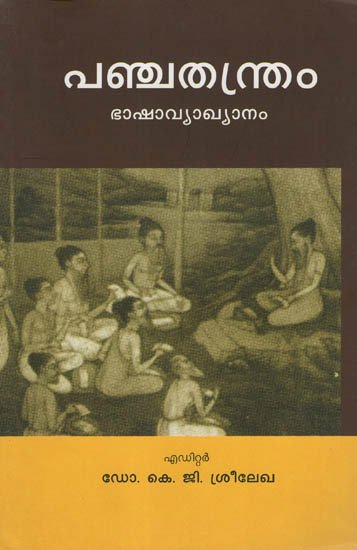Panchatantra [sanskrit]
by Dr. Naveen Kumar Jha | 2016 | 13,828 words | ISBN-13: 9788193077962
The Sanskrit edition of the Panchatantra referencing the English translation and grammatical analysis. Written by Vishnu Sharma and possibly dating as early as 1200 BCE, the Panchatantra (or Pancatantra) represents a collection of short stories teaching basic ethical values and moral conduct that was commonly practiced in ancient Indian. Alternative titles: Śrīviṣṇuśarman Pañcatantra (श्रीविष्णुशर्मन् पञ्चतन्त्र, Śrī-viṣṇuśarman pancatantra, श्री-विष्णुशर्मन्, Sri-visnusarman)
Verse 1.32
अप्रकटीकृत-शक्तिः शक्तो ऽपि जनस् तिरस्क्रियां लभते ।
निवसन्न् अन्तर्-दारुणि लङ्घ्यो वह्निर् न तु ज्वलितः ॥ ३२ ॥
aprakaṭīkṛta-śaktiḥ śakto 'pi janas tiraskriyāṃ labhate |
nivasann antar-dāruṇi laṅghyo vahnir na tu jvalitaḥ || 32 ||
The English translation of Panchatantra Verse 1.32 is contained in the book The Complete Pancatantra: Sanskrit Text with English Translation by Dr. Naveen Kumar Jha. This book is not available online so in order to read the full text and translation you should buy the book:
Buy now! English translation by Dr. Naveen Kumar Jha (2016)
Glossary of Sanskrit terms
Note: This extracts Sanskrit terms and links to English definitions from the glossary, based on an experimental segmentation of verse (1.32). Some terms could be superfluous while some might not be mentioned. Click on the word to show English definitions.
Kati, Katin, Krita, Shakti, Shakta, Shaktu, Api, Jana, Janas, Tiraskriya, Labhat, Vasat, Antar, Daru, Daruni, Langhya, Vahni, Jvalitri, Jvalita,
Analysis of Sanskrit grammar
Note: this is an experimental feature and only shows the first possible analysis of the Sanskrit text (Panchatantra Verse 1.32). If the system was successful in segmenting the sentence, you will see of which words it is made up of, generally consisting of Nouns, Pronouns, Verbs, Participles and Indeclinables. Click on the link to show all possible derivations of the word.
- Line 1: “aprakaṭīkṛta-śaktiḥ śakto 'pi janas tiraskriyāṃ labhate ”
- ap -
-
ap (noun, feminine)[compound]ap (noun, neuter)[compound], [adverb], [nominative single], [vocative single], [accusative single]
- ra -
-
ra (noun, masculine)[compound], [vocative single]ra (noun, neuter)[compound], [vocative single]
- kaṭī -
-
kaṭī (noun, feminine)[compound], [nominative single]kaṭi (noun, feminine)[nominative dual], [vocative dual], [accusative dual]kaṭin (noun, masculine)[nominative single]
- kṛta -
-
kṛta (noun, masculine)[compound], [vocative single]kṛta (noun, neuter)[compound], [vocative single]√kṛ -> kṛta (participle, masculine)[vocative single from √kṛ class 1 verb], [vocative single from √kṛ class 2 verb], [vocative single from √kṛ class 5 verb], [vocative single from √kṛ class 8 verb]√kṛ -> kṛta (participle, neuter)[vocative single from √kṛ class 1 verb], [vocative single from √kṛ class 2 verb], [vocative single from √kṛ class 5 verb], [vocative single from √kṛ class 8 verb]√kṛ (verb class 1)[injunctive middle third single]√kṛ (verb class 2)[imperative active second plural], [injunctive middle third single]√kṛ (verb class 5)[injunctive middle third single]√kṛ (verb class 8)[injunctive middle third single]
- śaktiḥ -
-
śakti (noun, feminine)[nominative single]śakti (noun, masculine)[nominative single]
- śakto' -
-
śakta (noun, masculine)[nominative single]√śac -> śakta (participle, masculine)[nominative single from √śac class 1 verb]√śak -> śakta (participle, masculine)[nominative single from √śak class 5 verb]śaktu (noun, masculine)[vocative single]śaktu (noun, feminine)[vocative single]
- api -
-
api (indeclinable preposition)[indeclinable preposition]ap (noun, neuter)[locative single]
- janas -
-
janas (noun, neuter)[compound], [nominative single], [vocative single], [accusative single]jana (noun, masculine)[nominative single]
- tiraskriyām -
-
tiraskriyā (noun, feminine)[accusative single]
- labhate -
-
√labh -> labhat (participle, masculine)[dative single from √labh class 1 verb]√labh -> labhat (participle, neuter)[dative single from √labh class 1 verb]√labh (verb class 1)[present middle third single]
- Line 2: “nivasann antar-dāruṇi laṅghyo vahnir na tu jvalitaḥ ”
- ni -
-
ni (noun, masculine)[compound], [adverb]ni (noun, neuter)[compound], [adverb], [nominative single], [vocative single], [accusative single]ni (noun, feminine)[compound], [adverb]nī (noun, masculine)[adverb]nī (noun, neuter)[compound], [adverb], [nominative single], [vocative single], [accusative single]nī (noun, feminine)[adverb]
- vasann -
-
√vas -> vasat (participle, masculine)[nominative single from √vas class 1 verb], [vocative single from √vas class 1 verb]
- antar -
-
antar (indeclinable preposition)[indeclinable preposition]antar (indeclinable)[indeclinable]
- dāruṇi -
-
dāruṇī (noun, masculine)[adverb], [vocative single]dāruṇī (noun, feminine)[compound], [adverb], [vocative single]dāruṇī (noun, neuter)[compound], [adverb], [nominative single], [vocative single], [accusative single]dāru (noun, neuter)[locative single]
- laṅghyo* -
-
laṅghya (noun, masculine)[nominative single]√laṅgh -> laṅghya (participle, masculine)[nominative single from √laṅgh class 1 verb], [nominative single from √laṅgh class 10 verb], [nominative single from √laṅgh]
- vahnir -
-
vahni (noun, masculine)[nominative single]
- na -
-
na (indeclinable particle)[indeclinable particle]na (noun, masculine)[compound], [vocative single]na (noun, neuter)[compound], [vocative single]
- tu -
-
tu (indeclinable particle)[indeclinable particle]
- jvalitaḥ -
-
jvalitṛ (noun, masculine)[vocative single]jvalita (noun, masculine)[nominative single]√jval -> jvalita (participle, masculine)[nominative single from √jval class 1 verb], [nominative single from √jval]
Other editions:
Also see the following editions of the Sanskrit text or (alternative) English translations of the Panchatantra Verse 1.32
Pancatantra of Visnusarman
by M. R. Kale (2015)
Panchatantra in Simple Sanskrit
by Dr. Vishwas (2016)
Panchatantram (Telugu)
by Tadanki Venkata Lakshmi Narasimha Rao (2020)
Published by J. P. Publications, Vijayawada; Throughout black & white Illustrations; 9788192053851.
Buy now!Preview of verse 1.32 in Telugu sript:
అప్రకటీకృత-శక్తిః శక్తో ఽపి జనస్ తిరస్క్రియాం లభతే ।
నివసన్న్ అన్తర్-దారుణి లఙ్ఘ్యో వహ్నిర్ న తు జ్వలితః ॥ ౩౨ ॥
Panchatantram Bhashavyakhyanam (Malayalam)
by Dr. K.G. Sreelekha (2010)
Published by the University of Kerala.
Buy now!Preview of verse 1.32 in Malayalam sript:
അപ്രകടീകൃത-ശക്തിഃ ശക്തോ ഽപി ജനസ് തിരസ്ക്രിയാം ലഭതേ ।
നിവസന്ന് അന്തര്-ദാരുണി ലങ്ഘ്യോ വഹ്നിര് ന തു ജ്വലിതഃ ॥ ൩൨ ॥
The Panchatantra Stories (Tamil)
by P. S. Aacharya (2017)
Published by Narmadha Pathippagam, Chennai.
Buy now!
Panchatantrer Galpa (Bengali)
by Children's Book Trust (2014)
Throughout color Illustration; 9788170112730
Buy now!Preview of verse 1.32 in Bengali sript:
অপ্রকটীকৃত-শক্তিঃ শক্তো ঽপি জনস্ তিরস্ক্রিযাং লভতে ।
নিবসন্ন্ অন্তর্-দারুণি লঙ্ঘ্যো বহ্নির্ ন তু জ্বলিতঃ ॥ ৩২ ॥
Panchatantra in Gujarati (Comic)
by Anant Pai (2013)
[શિયાળા અને રણશિંગ પંચતંત્ર] Published by Amar Chitra Katha; Throughout Color Illustrations; 9789350853115
Buy now!Preview of verse 1.32 in Gujarati sript:
અપ્રકટીકૃત-શક્તિઃ શક્તો ઽપિ જનસ્ તિરસ્ક્રિયાં લભતે ।
નિવસન્ન્ અન્તર્-દારુણિ લઙ્ઘ્યો વહ્નિર્ ન તુ જ્વલિતઃ ॥ ૩૨ ॥
![Panchatantra [sanskrit] - book cover](/uploads/a/Pancatantra.jpg)






